
In a move that has sparked significant controversy and concern among students and faculty, the University of Colorado Boulder (CU Boulder) has adopted a series of new policies aimed at regulating speech and expression on campus. While university administrators assert that the measures are designed to create a safer and more inclusive environment, many students fear that these policies represent a troubling erosion of free speech and academic freedom at one of the nation’s leading public universities.
The New Policies
The administration unveiled the new policies during a press conference last week, outlining their intent to address growing concerns about hate speech, harassment, and the impact of online discourse on campus climate. The policies include stricter guidelines on what constitutes acceptable speech, increased penalties for violations, and enhanced monitoring of social media activity related to the university community.
The university’s leadership highlighted a perceived rise in hate speech incidents and bullying in recent years, citing several high-profile cases that have created an atmosphere of fear and intimidation for some students. According to CU Boulder Chancellor Philip DiStefano, the university is committed to fostering an environment where all students feel safe and respected.
“We want to ensure that everyone on our campus feels they can express themselves without fear of harassment or discrimination,” DiStefano stated. “These policies are a proactive step toward protecting our diverse community and maintaining a culture of respect.”
The policies specifically define hate speech, harassment, and discrimination, establishing clear boundaries that the university considers unacceptable. The guidelines emphasize the importance of civility in discourse, and violations can result in disciplinary actions ranging from warnings to expulsion.
Student and Faculty Reactions
Reactions to the new policies have been swift and polarized. Many students have expressed outrage, arguing that the measures stifle open dialogue and academic freedom. Student organizations, including the CU Boulder College Republicans and the CU Boulder Young Democrats, have issued statements condemning the policies, claiming they could lead to self-censorship among students and faculty.
“While we all agree that hate speech has no place on our campus, these policies go too far,” said Emily Johnson, a junior studying political science and president of the College Republicans. “We need to foster a culture of open dialogue where all ideas can be expressed, even those we may disagree with.”
Faculty members have echoed similar concerns. Dr. Mark Hughes, a professor of philosophy at CU Boulder, warned that the policies could infringe on academic discourse, stating, “The university’s role is to challenge students intellectually, and these new guidelines could deter professors from presenting controversial ideas for fear of reprisal.”
Many faculty members are concerned that the new policies may inadvertently lead to a chilling effect on academic inquiry and debate. There are fears that professors may self-censor, avoiding difficult topics or controversial discussions that are essential to a well-rounded education.
The Impact on Campus Climate
The controversy surrounding the new policies has highlighted the ongoing tension between free speech and inclusivity in higher education. Advocates for the new measures argue that they are necessary to create a safe and welcoming environment for all students, especially those from marginalized backgrounds. However, critics assert that the policies could lead to an oppressive atmosphere where students are afraid to voice their opinions or engage in meaningful discussions.
The introduction of these policies comes amid a broader national debate over free speech on college campuses. Numerous universities across the country have faced similar challenges, grappling with how to balance the need for free expression with the responsibility to protect students from harassment and discrimination.
At CU Boulder, some students have reported feeling marginalized by the presence of hate speech and derogatory comments on campus. In response to these feelings, student-led movements have emerged, advocating for more inclusive policies and initiatives that promote diversity and equity.
“I want to be able to share my experiences as a marginalized student without worrying about being silenced or attacked,” said Maria Gonzalez, a senior studying sociology. “We need to find a way to create safe spaces while still allowing for open dialogue.”

A Path Forward
As the campus community grapples with the implications of the new policies, discussions about the future of free speech at CU Boulder are likely to intensify. The university has pledged to engage with students and faculty to assess the impact of these measures and to consider potential revisions based on feedback.
Chancellor DiStefano has indicated that the administration is open to dialogue and is committed to finding common ground. “We understand that this is a sensitive issue, and we want to hear from our community,” he said. “We need to work together to ensure that our campus remains a place of learning, exploration, and respect.”
In the coming weeks, CU Boulder plans to hold a series of town hall meetings and forums, allowing students and faculty to voice their concerns and share their perspectives on the new policies. The administration has expressed a willingness to reconsider aspects of the guidelines based on the feedback received during these sessions.
Legal Implications and Concerns
Legal experts have weighed in on the situation, emphasizing the delicate balance between a university’s right to regulate speech and the constitutional protections afforded to individuals. While public universities are permitted to set certain guidelines for conduct, they must also uphold the principles of free speech enshrined in the First Amendment.
“The challenge for universities is to navigate these complex legal and ethical waters,” said Professor Jane Stevens, a constitutional law expert at CU Boulder. “They must create a safe environment for all students while respecting the rights of individuals to express their opinions, no matter how controversial.”
As legal challenges to similar policies have arisen in other universities across the country, CU Boulder could find itself at the center of a legal battle if students choose to contest the new regulations. Advocacy groups that prioritize free speech on college campuses are closely monitoring the situation, and they may take action if they believe the policies infringe on constitutional rights.
A National Conversation
The debate over free speech and inclusivity at CU Boulder is part of a larger national conversation that has gained momentum in recent years. Issues surrounding hate speech, political correctness, and the role of universities in shaping public discourse have become focal points in academic and political circles.
As universities strive to foster inclusive environments while also protecting free expression, the outcome of CU Boulder’s situation may set a precedent for other institutions grappling with similar challenges. The decisions made in Boulder could influence the development of policies at universities nationwide, making it imperative for stakeholders to engage in constructive dialogue and seek common ground.
Conclusion
As CU Boulder navigates this complex landscape of free speech and inclusivity, the stakes are high for students, faculty, and the broader community. The recently adopted policies have generated a significant response, raising questions about the future of open dialogue on campus and the balance between protecting individuals and upholding the right to free expression.
While the university administration remains committed to fostering a safe and inclusive environment, the concerns raised by students and faculty must be taken seriously. The path forward requires thoughtful consideration, open dialogue, and a shared commitment to preserving the values that define higher education.
As discussions continue and town hall meetings are held, CU Boulder stands at a crossroads—one that will shape its identity and impact the educational experience for generations to come. The outcome of this situation will not only affect the campus community but also serve as a bellwether for how universities across the nation approach the complex interplay between free speech and inclusivity in an increasingly polarized world.